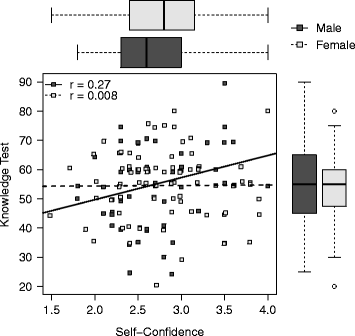Self-confidence and knowledge of German ICU physicians in palliative care - a multicentre prospective study
- PMID: 29166887
- PMCID: PMC5700543
- DOI: 10.1186/s12904-017-0244-6
Self-confidence and knowledge of German ICU physicians in palliative care - a multicentre prospective study
Abstract
Background: Little is known about ICU physicians' self-confidence and knowledge related to palliative care. Our objective was to investigate self-confidence and knowledge of German ICU physicians related to palliative care, and to assess the impact of work experience, gender, specialty and additional certifications in pain or palliative medicine.
Methods: In a multicentre prospective observational study ICU physicians of ten hospitals were asked to rate their self-confidence and to complete a multiple choice questionnaire for the assessment of knowledge. Beyond descriptive statistics and non-parametric tests for group comparisons, linear regression analysis was used to assess the impact of independent variable on self-confidence and knowledge. Spearman's rank test was calculated.
Results: 55% of answers in the knowledge test were correct and more than half of the participants rated themselves as "rather confident" or "confident". Linear regression analysis revealed that an additional certificate in either pain or palliative medicine significantly increased both knowledge and self-confidence, but only 15 out of 137 participants had at least one of those certificates. Relation between self-confidence and the results of the knowledge test was weak (r = 0.270 in female) and very weak (r = -0.007 in male).
Conclusions: Although the questionnaire needs improvement according to the item analysis, it appears that, with respect to palliative care, ICU Physicians' self-confidence is not related to their knowledge. An additional certificate in either pain or palliative medicine was positively correlated to both self-confidence and knowledge. However, only a minority of the participants were qualified through such a certificate.
Keywords: Critical care; Gender; Knowledge; Palliative care; Self-confidence.
Conflict of interest statement
Ethics approval and consent to participate
The study was approved by the Ethics Committee of the medical faculty of the Technische Universität München (N° 5314/12, March 5th 2012).
The participants and heads of the involved departments provided written informed consent.
Consent for publication
Not applicable.
Competing interests
The authors declare that they have no competing interests.
Publisher’s Note
Springer Nature remains neutral with regard to jurisdictional claims in published maps and institutional affiliations.
Figures


Similar articles
-
Palliative care knowledge and self-efficacy: a comparative study between intensive care units and general units nurses.BMC Palliat Care. 2024 Oct 22;23(1):246. doi: 10.1186/s12904-024-01580-7. BMC Palliat Care. 2024. PMID: 39438875 Free PMC article.
-
Pediatric palliative care: an assessment of physicians' confidence in skills, desire for training, and willingness to refer for end-of-life care.Am J Hosp Palliat Care. 2008 Apr-May;25(2):100-5. doi: 10.1177/1049909107312592. Am J Hosp Palliat Care. 2008. PMID: 18445861
-
Palliative Care in the Intensive Care Unit: Are Residents Well Trained to Provide Optimal Care to Critically ill Patients?Am J Hosp Palliat Care. 2015 Nov;32(7):758-62. doi: 10.1177/1049909114536979. Epub 2014 May 30. Am J Hosp Palliat Care. 2015. PMID: 24879883
-
Effects of a postqualification course in palliative care.J Adv Nurs. 2005 Jan;49(1):96-103. doi: 10.1111/j.1365-2648.2004.03268.x. J Adv Nurs. 2005. PMID: 15610386 Review.
-
Critical Care at the End of Life.Semin Respir Crit Care Med. 2015 Dec;36(6):921-33. doi: 10.1055/s-0035-1565254. Epub 2015 Nov 24. Semin Respir Crit Care Med. 2015. PMID: 26600274 Review.
Cited by
-
Cultural Adaptation, Validation, and Analysis of the Self-Efficacy in Palliative Care Scale for Use with Spanish Nurses.Int J Environ Res Public Health. 2019 Dec 2;16(23):4840. doi: 10.3390/ijerph16234840. Int J Environ Res Public Health. 2019. PMID: 31810175 Free PMC article.
-
The CARE project - study protocol and pilot results from the Polish population.Front Psychiatry. 2025 Jul 23;16:1643722. doi: 10.3389/fpsyt.2025.1643722. eCollection 2025. Front Psychiatry. 2025. PMID: 40771646 Free PMC article.
-
The association of the anesthesiologist's academic and educational status with self-confidence, self-rated knowledge and objective knowledge in rational antibiotic application.BMC Res Notes. 2020 Mar 18;13(1):161. doi: 10.1186/s13104-020-05010-8. BMC Res Notes. 2020. PMID: 32188509 Free PMC article.
-
Gender Differences in Perceived Working Conditions of General Practitioners During the COVID-19 Pandemic-a Cross-Sectional Study.J Gen Intern Med. 2023 Jun;38(8):1894-1901. doi: 10.1007/s11606-023-08166-8. Epub 2023 Mar 27. J Gen Intern Med. 2023. PMID: 36971880 Free PMC article.
-
Palliative Care Principles and Anesthesiology Clinical Practice: Current Perspectives.J Multidiscip Healthc. 2021 Sep 27;14:2719-2730. doi: 10.2147/JMDH.S240563. eCollection 2021. J Multidiscip Healthc. 2021. PMID: 34611408 Free PMC article. Review.
References
-
- Laugsand EA, Kaasa S, de Conno F, Hanks G, Klepstad P. Research steering Committee of the E: intensity and treatment of symptoms in 3,030 palliative care patients: a cross-sectional survey of the EAPC research network. J Opioid Manag. 2009;5(1):11–21. - PubMed
-
- Nelson JE, Bassett R, Boss RD, Brasel KJ, Campbell ML, Cortez TB, Curtis JR, Lustbader DR, Mulkerin C, Puntillo KA, et al. Models for structuring a clinical initiative to enhance palliative care in the intensive care unit: a report from the IPAL-ICU project (improving palliative care in the ICU) Crit Care Med. 2010;38(9):1765–1772. doi: 10.1097/CCM.0b013e3181e8ad23. - DOI - PMC - PubMed
Publication types
MeSH terms
LinkOut - more resources
Full Text Sources
Other Literature Sources
Medical

